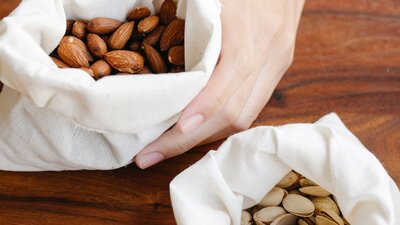Plants are a valuable source of food for living a healthier life. The plant-based community has long debated the value of their protein sources, encountering the topic more than they wished. What does the data have to say about protein in a plant-based diet? Protein intake can be optimized on a plant-based diet as easy as any other diet.
Plant Powered
Vegans can get enough protein without the chicken-rice-broccoli formula. The first step is replacing the lean protein in the meal. Animal proteins are complete proteins, foods containing all the essential amino acids. There are plant proteins that are high in amino acids too, the building blocks of proteins. While animal proteins are reliable complete proteins, plant proteins can still provide an adequate amount of this crucial macronutrient.
Complete plant proteins such as seitan, tempeh, and soy include the essential amino acids. Other high-profile plants are in the high-carb legume family, such as lentils and beans. Meanwhile, nuts and seeds provide healthy fats alongside protein. Not only do these options provide protein, they also pack tons of fiber to fuel the gut.
One issue is the (lack of) presence of leucine. Plants do not have as much leucine, an amino acid that stimulates muscle growth (1). Thankfully, protein pairing can resolve this missing building block. By combining two sources of protein, each one can complement the missing amino acids of the other (2). This creates creative meals out of protein science. A bowl of quinoa and edamame can be topped with hemp and pumpkin seeds. A smoothie can pack a variety of amino acids and flavors through nuts, grains, and protein supplements.
Protein supplements are convenient lean sources of protein. Plant supplements are gaining attention, becoming a competitor against whey protein. These supplements isolate the protein from plants the same way whey protein is isolated from dairy. They occasionally come fortified with vitamins, minerals, and additional amino acids as well. It should be noted that consuming a protein isolate may not require protein pairing unless a higher protein intake is desired (2). There are a variety of sources to choose from, between pea, soy, hemp, and rice protein. Some protein supplements even blend isolated proteins together to provide a high and complete amino acid profile.
Fiber-Fueling Yourself
Each person requires a different amount of protein. While the RDA ranges from 0.8g/kg (3) to 1.2-1.8g/kg (4), this varies by metabolism and activity levels. To find out your personal total daily energy expenditure and protein intake, check out our site’s Nutrition Calculators. Plants can have a crucial role in fueling people no matter their lifestyle.
Strength training requires more protein than ordinary diets. These activities need protein to recover the tearing of muscle fibers through muscle protein synthesis (MPS). As addressed previously, plants can provide adequate protein between whole foods and supplements. They can be used for proper MPS.
Whey protein is known to be the fastest digesting protein when compared to casein and plant proteins. However, plants have an edge on the oxidation of the protein (1)(5). Rather than aiding in muscle repair, they can accelerate the fueling of the body.
Endurance athletes run on fiber. Puns aside, they can use all the fuel they can get. These athletes deplete their glycogen stores more than strength trainers. Therefore, they need more carbohydrate-driven diets. A plant-based diet has become popular in the endurance community because of this idea. When comparing vegan and omnivore endurance athletes, the vegan athletes had lower heart rates at rest, ventilatory anaerobic threshold, and maximal work (3). As for protein intake, the target is not as high as strength trainers. While protein is not a priority in their diet, it can still be useful in post-exercise recovery.
Plant-based diets have also been proven to be successful in weight loss. One study compared two groups of overweight people: one following an omnivore diet and another following a vegan diet. Despite the vegans obtaining less protein, they had lower fat mass, BMI, and overall weight (6). Even though high-protein diets are favored for weight loss, this fiber-fueled diet can be a solid alternative option.
Planting the Seeds
Protein intake is not the greatest concern for plant-based diets. Topics such as longevity, quality of nutrition, and overall energy should have more focus. Take a holistic approach to your diet, and savor how good your body feels and performs.
Works Cited

